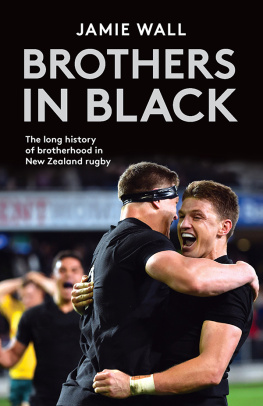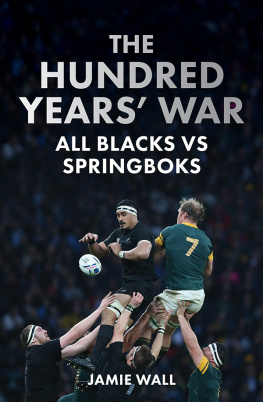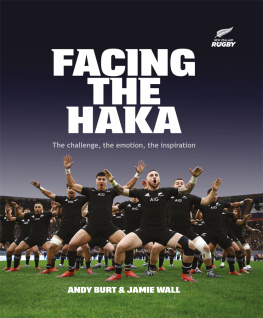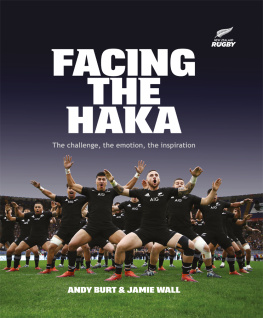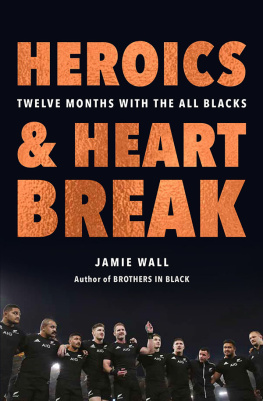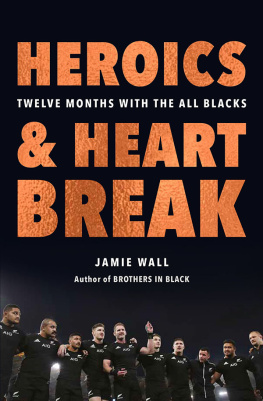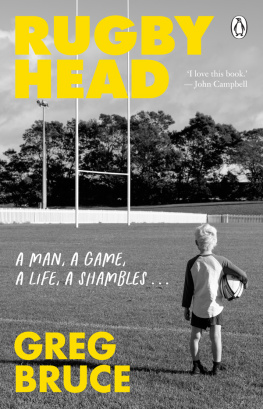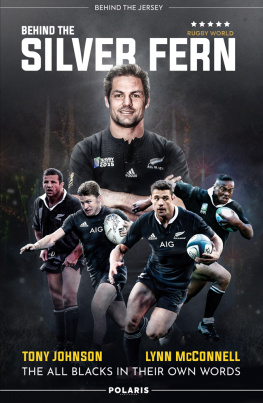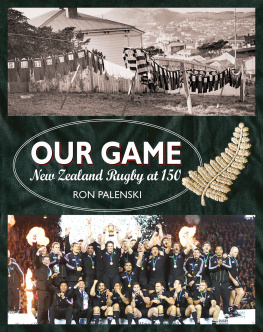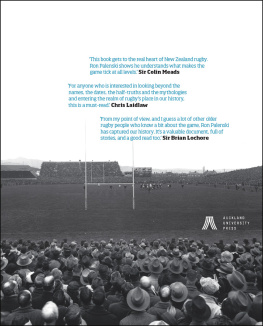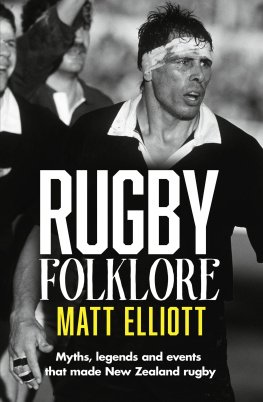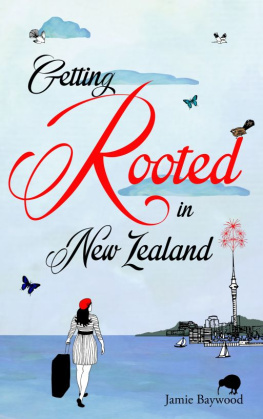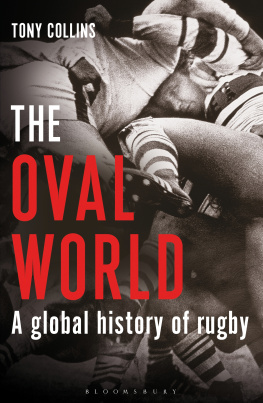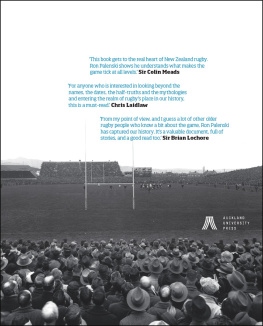Jamie Wall - Brothers in Black: The Long History of Brotherhood in New Zealand Rugby
Here you can read online Jamie Wall - Brothers in Black: The Long History of Brotherhood in New Zealand Rugby full text of the book (entire story) in english for free. Download pdf and epub, get meaning, cover and reviews about this ebook. year: 2019, publisher: Allen & Unwin, genre: Home and family. Description of the work, (preface) as well as reviews are available. Best literature library LitArk.com created for fans of good reading and offers a wide selection of genres:
Romance novel
Science fiction
Adventure
Detective
Science
History
Home and family
Prose
Art
Politics
Computer
Non-fiction
Religion
Business
Children
Humor
Choose a favorite category and find really read worthwhile books. Enjoy immersion in the world of imagination, feel the emotions of the characters or learn something new for yourself, make an fascinating discovery.
- Book:Brothers in Black: The Long History of Brotherhood in New Zealand Rugby
- Author:
- Publisher:Allen & Unwin
- Genre:
- Year:2019
- Rating:3 / 5
- Favourites:Add to favourites
- Your mark:
- 60
- 1
- 2
- 3
- 4
- 5
Brothers in Black: The Long History of Brotherhood in New Zealand Rugby: summary, description and annotation
We offer to read an annotation, description, summary or preface (depends on what the author of the book "Brothers in Black: The Long History of Brotherhood in New Zealand Rugby" wrote himself). If you haven't found the necessary information about the book — write in the comments, we will try to find it.
Brothers in Black: The Long History of Brotherhood in New Zealand Rugby — read online for free the complete book (whole text) full work
Below is the text of the book, divided by pages. System saving the place of the last page read, allows you to conveniently read the book "Brothers in Black: The Long History of Brotherhood in New Zealand Rugby" online for free, without having to search again every time where you left off. Put a bookmark, and you can go to the page where you finished reading at any time.
Font size:
Interval:
Bookmark:

First published in 2019. This edition published in 2020.
Text Jamie Wall 2019
All rights reserved. No part of this book may be reproduced or transmitted in any form or by any means, electronic or mechanical, including photocopying, recording or by any information storage and retrieval system, without prior permission in writing from the publisher.
Allen & Unwin
Level 2, 10 College Hill, Freemans Bay
Auckland 1011, New Zealand
Phone: (64 9) 377 3800
Email:
Web: www.allenandunwin.co.nz
83 Alexander Street
Crows Nest NSW 2065, Australia
Phone: (61 2) 8425 0100
A catalogue record for this book is available from the National Library of New Zealand.
ISBN 978 1 98854 749 7
eISBN 978 1 76087 181 9
Design by Kate Barraclough
Cover photograph: Peter MacIntosh for the Otago Daily Times
FOR PAUL H
BROTHERS ON THREE! ONE-TWO-THREE BROTHERS! That was part of the ritual at our home of Kilbirnie Park, or wherever we ended up playing on Wellingtons numerous club rugby fields. Many were, and probably still are, of dubious quality. Most of us were never going to play in a higher grade. Some, like me, spent a good chunk of our time watching from the sidelines with water bottles or linesmens flags in our hands. But it never stopped our Senior 1sts, and every other team from Poneke FC (a club so ancient its older than the convention of calling it rugby), sounding out that call before a game, at half-time, at full-time, and at the end of every training. On every park, in every changing room where the paint is peeling from the walls, on every freezing night under lights in the driving rain.
It becomes ingrained in you. This idea that rugby is indeed a brotherhood, that youve got this feeling of belonging that no one else can understand. You and your teammates all go through something together, strive to achieve the same goal for 80 minutes, sweat, bleed and fight until you walk off, bonded.
Of course, if youve ever read anything about rugby at any level of the game, none of this will be new. Its not even unique to rugbyyoull find it in pretty much every other team sport or social pursuit. We all aspire to belong to something, which is why we invoked that fraternal phrasing so often. Were all brothers out there, because to think of it that way makes us play better, because were playing for each other.
But what about the ones who have felt that way since birth? The literal brothers who step out onto the field alongside one another, bringing the genetic connection, the shared skills, the deepened knowledge. Its hard to imagine playing rugby as a kid and not playing in a team with some sort of brotherly connection. Its essentially impossible to be in a rugby club that doesnt have one.
Were all brothers out there, because to think of it that way makes us play better, because were playing for each other.
The vast majority will play out their careers without any fanfare. Some may end up on an honours board, or in a club blazer. Every now and then one will hit the big time. Then there are those brothers who make it together, who go all the way. To the holy grail of rugby: an All Blacks jersey.
Brothers have been part of the All Blacks since the beginning. Through both world wars, when the game itself went through a gigantic upheaval. Through the amateur era of punch-ups and mud, to the big money- and media-driven world we live in today. One thing is for certain: they have played a part in almost every single notable event in the teams history.
There were brothers on the Invincibles tour. Brothers in the 1956 first-ever series win over the Springboks. Twin brothers on the field when the All Blacks first won the World Cup in 1987. Brothers among the first names listed for the series win in South Africa in 1996. Brothers in the side that won the World Cup final in 2011 (one out on Eden Park and one on the bench). A try-scorer in the 2015 final would later become one of the first trio of brothers to take the field together for the All Blacks.
Across history, its a story that is told and retold. Some of the names here will be familiar, like Clarke and Meads, Savea and Barrett. Some might not be, unless youre old enough to remember them or are a bit of a rugby historian. To see the teams history through their experience is to be granted a unique look at the most powerful force in world sport.
They are the Brothers in Black. This is their story.

The 1883 Auckland representative team photo features a 21-year-old Joe Warbrick right in the middle, draping his arms around the player in front. NEW ZEALAND RUGBY MUSEUM
THIRTEEN MONTHS AWAY FROM HOME. One hundred and seven matches. A tour that laid the foundations of test rugby, put together by one of five brothers from the Bay of Plenty and bolstered by another three from Auckland. If rugby truly is New Zealands religion, then this is the chapter of Genesis, and the Warbrick and Wynyard brothers are its prophets.
If youre not religious, heres a more scientific way of explaining just how long ago this story takes place. You can look at the history of the game in at least three distinct eras. There is the time we have now, the modern age in which every single drop of sweat that drips from the players brows is caught in slow motion as it falls onto their scientifically designed and sponsor-laden jerseys. There was the amateur age, in which sleeves were longer, boots and rucks actually got dirty, and the compensation for sacrificing your body and time for an All Blacks jersey was some free beers and a pat on the back.
But while that amateur era is what everyone gets all misty-eyed and somewhat hypocritically nostalgic over, there was an even earlier time in which rugby in New Zealand evolved from the ether. The primordial ooze. A Cambrian Explosion as opposed to the amateur ages Cretaceous Period that ended with the dinosaurs who had ruled the game for so long finally dying out.
The story of Joseph, Frederick, William, Alfred and Arthur Warbrick and George, Henry and William Wynyard is the prehistory of the All Blacks. They played in a New Zealand representative side that existed long before the team known as The Originals made the All Blacks name famous, and generations before the game was used by players as a way of making money. Because theres the twist in this one: thats exactly why the Warbricks, Wynyards and the rest of the 188889 New Zealand Natives set out for their epic tour of Great Britain. It was a revenue-gathering exercise, in a time when the laws around amateurism were still being dreamed up and fought about in London gentlemens clubs. They were the pioneers of an age when New Zealand, and indeed the rest of the world, was barely recognisable compared to what exists today.
To set the scene, this was a country in which Mori and Pkeh had only recently finished fighting an actual war for control of large parts of the North Island. Aucklands population was 130,000, and infant mortality was outrageously high. So its a minor miracle that the five Warbrick brothers even made it to school age. They were born between 1860 and 1868 in Rotorua, with their father, Abraham, an English immigrant and mother, Nga Karauna Paerau, of Ngti Rangitihi descent.
Joe Warbrick was a forward-thinking man with a plan by the time hed finished at St Stephens Native School in what is now South Auckland. While he was still a young teenager he took the opportunity to play senior club rugby for the Ponsonby club up the line in the city. This was, of course, in the late nineteenth century, so the game of rugby barely resembled what it is now.
Font size:
Interval:
Bookmark:
Similar books «Brothers in Black: The Long History of Brotherhood in New Zealand Rugby»
Look at similar books to Brothers in Black: The Long History of Brotherhood in New Zealand Rugby. We have selected literature similar in name and meaning in the hope of providing readers with more options to find new, interesting, not yet read works.
Discussion, reviews of the book Brothers in Black: The Long History of Brotherhood in New Zealand Rugby and just readers' own opinions. Leave your comments, write what you think about the work, its meaning or the main characters. Specify what exactly you liked and what you didn't like, and why you think so.

